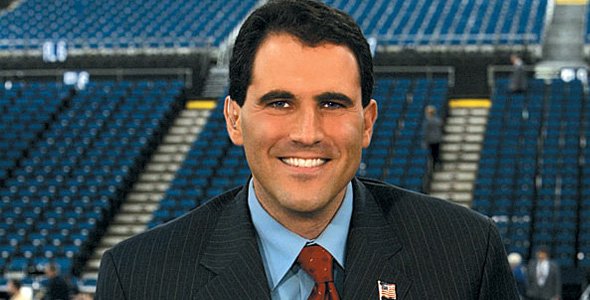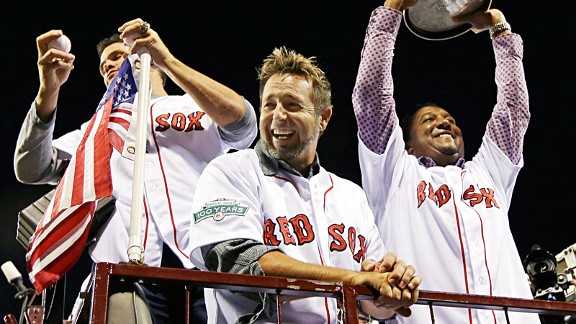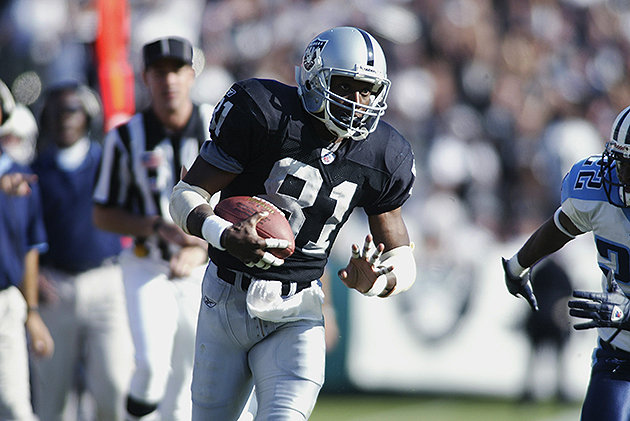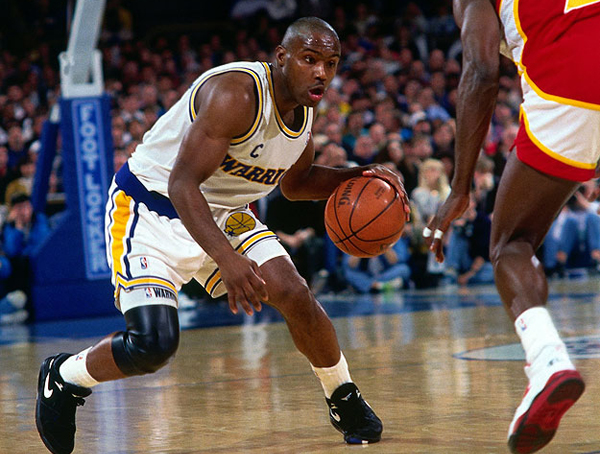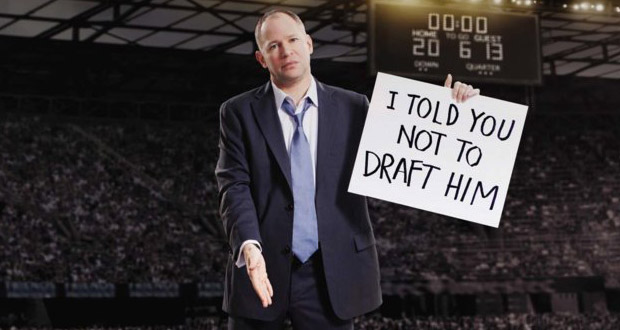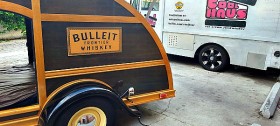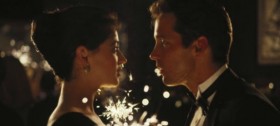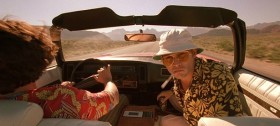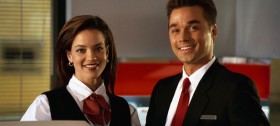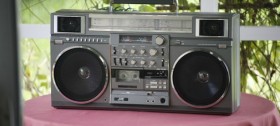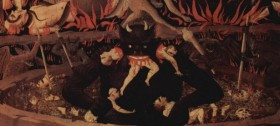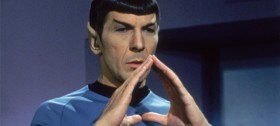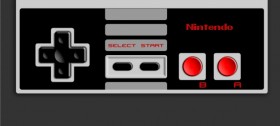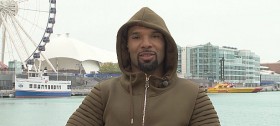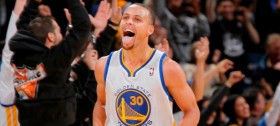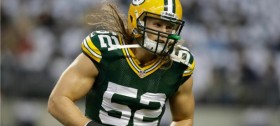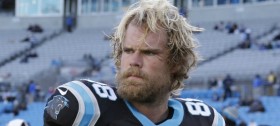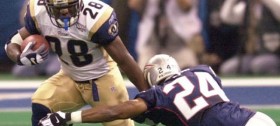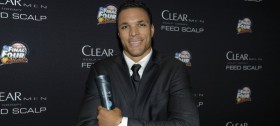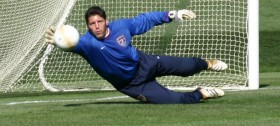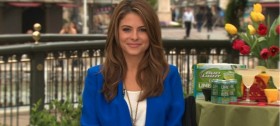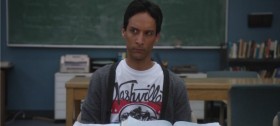Sports

Seth Davis tells MANjr why fans need to check out the Campus Insider App
A new mobile app launched by Campus Insiders takes fans deep inside college sports with game highlights, interviews and a behind-the-scenes perspective of the trending stories of the day, from on-camera hosts Bonnie Bernstein and Seth Davis, as well as top college analysts, former coaches and special contributors.
Campus Insiders is the online destination and leading digital content syndication source for college sports fans. The app is free and now available for iPhone, iPad and Android devices. It provides an interactive user experience that enables college sports fans to access the same content available at CampusInsiders.com, along with the insight and perspective of Campus Insiders’ stable of experts, including broadcasters Bonnie Bernstein, Seth Davis and the nearly 100 Insiders from college campuses across the country.
The Campus Insiders app features breaking news and video alert, video on-demand, filtered by sport, and daily original programming, including live programming (starting this Fall) featuring Bonnie Bernstein and Seth Davis.
I had the great pleasure to speak with Seth Davis about the Campus Insider website and app, college football and basketball, and much more.
Art Eddy: Tell me about your new project “The Seth Davis Show.”
Seth Davis: It is a really exciting project for me. Took a long time to come up with the name of the show. We got really creative and outside the box and came up with “The Seth Davis Show.” It is for this new all-digital sports network called Campus Insiders. The future is hear. This is all digital. The website we have is Campus Insiders dot com.
The way this model works is instead of getting you to come to us, we are going to come to you. Whether it is through Twitter, there are literally hundreds of websites out there that are distributing content. As name of the network indicates it is based on insider access and information. The network is partnering with IMG College, which owns the broadcast rights to many FBS schools. We are going to be talking to people who are at these schools all the time. My role on “The Seth Davis Show” is to do more long form sit down interviewing, which is what I enjoy.
AE: I love the idea about how Campus Insiders gives you the all access feel to campuses around the country. What type of guests can we expect to see coming up on your show?
SD: Even though college basketball is my bailiwick as you know Art, we are going to be very football heavy, especially at the start. I have already interviewed Bob Stoops and Will Muschamp, Mack Brown and Steve Spurrier. I talked a little basketball with Billy Donovan when I was in Gainesville, but I will be talking to Larry Scott the PAC-12 Commissioner.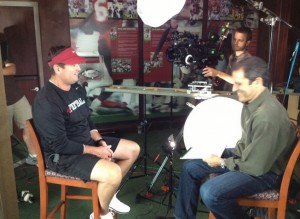
It is going to be a college sports type franchise, type of show, but I reserve the right to go off topic. I happen to live in Los Angeles. I have moved here with my family. If I happen to be able to grab a movie star here or there, or a pro athlete or a pro coach here or there, the bottom line is I call it smart conversations with interesting people. There are no rules, so you can’t say the rules apply because this is a brand new concept of distributing content. So there are no rules and we are going to have a lot of fun.
AE: Besides the great work you do for CBS Sports and Sports Illustrated which is a lot already. Can you tell me how you got involved with Campus Insiders?
SD: Well the guys who are running Campus Insiders, Jason Coyle, Josh Wine, Crowley Sullivan; these are guys that not only I know, but everybody knows. They have been around the block a lot. They have been in the industry a lot, so I always have maintained a running dialogue. I am also managed by IMG, so this is really important to IMG and IMG College to get into this digital space.
There are certain things that I do well and there are certain things that I don’t do well. Campus Insiders you look at me and you look at Bonnie, (Bernstein) we are very opinionated people, but we covered college sports a long time. We are not necessarily looking to say the single most inflammatory thing we can say all the time. I certainly have very strong opinions. Just ask my wife. (Laughs)
What I try to deliver for Campus Insiders is the same thing I try to deliver for CBS. It is the same thing that I deliver for Sports Illustrated, which is journalism. Hopefully high quality journalism that is fair, that is balanced, that is informative and opinionated. By the way it should be entertaining. I am cognizant of the fact that this is sports. This is not the war in Afghanistan we are talking about. This is supposed to be fun. When I go into these interviews the first thing I say to these folks is let’s have some fun here. It is a foreign concept to these college football coaches. It is having fun at work. It is not supposed to be fun they think, but for the thirty minutes that we are in front of this camera it is okay to have fun.
AE: With college football in sight, what are some of the things we as fans should look out for on Campus Insiders?
SD: For me, it will be the more long form interview type. The answer really Art is I am not sure. That is what is exciting about it. I come out of the TV world. I have a show on the CBS Sports Network during the college basketball season called “Courtside.” It is on every Wednesday at 7 o’clock. You are locked in.
When you are in the digital space you are not so quite locked in. If we want to do Tuesday this week instead of Monday or do we want the segment to be 12 minutes instead of 35 minutes. We are kind of throwing things against the wall and seeing what works. We want to be high level in terms of our presentation and our information. You are getting good information. It is being presented in an opinionated and fun way, but it is also authentic.
I don’t think you are going to see people, and I am not denigrating other anybody, but I don’t think you are going to see me and Bonnie screaming at each other. We may debate or argue, but I would like to think of it as high level, smart, fun conversation between two people who don’t take themselves too seriously.
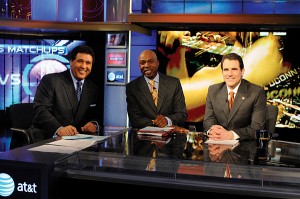 AE: I enjoy your work at CBS Sports as you cover NCAA men’s college basketball. You went to Duke. Is it hard to not be a homer when breaking the games down?
AE: I enjoy your work at CBS Sports as you cover NCAA men’s college basketball. You went to Duke. Is it hard to not be a homer when breaking the games down?
SD: (Laughs) You know what, it is not hard at all. I get this question a lot. They are like the Yankees man. A lot of people say to me is it hard to be critical of Duke. First of all there is not that much to criticize. What are you really going to say about them? The answer is it is much harder to praise them.
I wish it wasn’t this way, but I am cognizant of this because everybody knows that I went to Duke because folks like you bring it up to me all the time. If I am inclined to praise them I find myself not doing it that much. It is hard for me to say good things about them because people say he just saying that because he went to Duke.
Well I say the win a lot. They don’t really cheat. Coach K is the USA Basketball coach. There is really not a whole lot of bad things you can say about them. That doesn’t mean I will not criticize them. When I put on my suit and tie, when I get behind my desk I am a journalist, an analyst, and an expert. That is how I deal.
I would be less than honest if I said when I watch Duke, do I want to see them win. Of course I do. I went to that school. It is in my blood. I really do believe that the vast, vast majority of readers and fans understand the difference between those two things. It is just the one percent who ride me on Twitter, but that is the kind of age we live in now. (Laughs.)
Aug 28th

Former Red Sox Kevin Millar tells MANjr what it is like to win the World Series
Kevin Millar had many outstanding moments in his Major League Baseball career. The 2004 season has to rank really high up for him. That year he and the rest of the Boston Red Sox did the unbelievable by beating a 0-3 series deficit against the New York Yankees in the ALCS to move on in the playoffs and eventually win the World Series.
Now retired from the game he loves, Kevin is the co-host of the phenomenal show “Intentional Talk” with Chris Rose on the MLB Network. The show airs weekdays at 5 PM EST. If you have never seen this show you are missing out on some good times. Kevin and Chris talk baseball, but discuss a whole lot more. They even get players from around the league to sing on television. What other shows can do that? Not many!
I had the great pleasure of talking with Kevin about his time in the majors, his show “Intentional Talk,” and winning the World Series.
Art Eddy: I know that you have spoken about this issue at great length, but I have to ask you to put a bow on the Ryan Dempster and Alex Rodriguez fiasco?
Kevin Millar: I think that once everyone has their own opinions, because the bottom line is that what is the right thing to do? Players are upset that A-Rod is playing. They feel that he should be suspended. They feel that he should be serving his suspension. There is an appeal process that Alex has the right to go through, which any other player would go through, and he is appealing this process.
I think the whole bottom line is that we know too much about Alex Rodriguez’s situation. It is public knowledge. For some reason it has been public knowledge and most players that appeal their process we don’t hear about it. There has been a ton of players that have appealed. Melky Cabrera. Miguel Tejada was just playing through an appeal process. Ryan Braun played through his appeal process, but no one knew about it.
Alex Rodriguez, we all knew about it. Players are kind of angry because one now you are judging a guy. The other side of it is the Ryan Dempster situation. The first pitch behind the calf. Did it shock everybody? Sure it did. It wasn’t a dangerous pitch. I do think we blow things out of proportion because it is Alex Rodriguez and the situation. There are players in baseball that get hit every single night. We saw Bryce Harper get drilled in the thigh two weeks ago when he hit a home run off of (Julio) Teheran.
So this happens. It is baseball. I mean my goodness gracious Dempster hits A-Rod. He hits his elbow pad, grazes him in his ribs and it became a huge story. I think everybody is confused. Everyone has got their own opinion. I really don’t know the right situation or the right way. I don’t want to be the Red Sox homer and be anti-A-Rod. That is not what I am about. I am just confused.
This is the first time I think that we have seen this in our sport, ever. It is a lightning rod and Alex Rodriguez should be serving a major suspension and he is going through the appeal process. Players are angry and you are hearing voices. We saw the first action by a Major League player in Ryan Dempster.
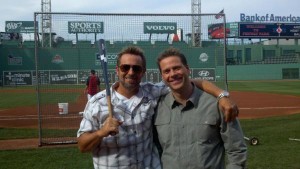 AE: Before we talk about your career in the majors, I want to talk about the show you co-host with Chris Rose called Intentional Talk that launched April 2011 on the MLB Network. It looks like you have blast on that show. You and Chris work great together. How did you get involved to be on the show?
AE: Before we talk about your career in the majors, I want to talk about the show you co-host with Chris Rose called Intentional Talk that launched April 2011 on the MLB Network. It looks like you have blast on that show. You and Chris work great together. How did you get involved to be on the show?
KM: First of all it is a tremendous show. The reason why I say that is if you have one game the Red Sox and Yankees game and you have five different shows, you can only talk about that game so many times. Yankees win 3-1 and (Robinson) Cano hits a three run home run, how many times and spins can you see the Cano home run and that they Yankees won?
It started back then and we love to laugh. I am not a comedian by any means. What you see is what you get, but I am a little goofy. What you see is going to be from my heart. You are going to laugh. It is different. You are going to have relevant videos. You are going to have a player interview every day. We are not going to talk baseball half the time. We are going to ask them a lot of funny questions. Every week we try to get better.
We have a rapid fire segment that is just off the wall questions that players love. It is shocking some of the questions. Two days ago we had J. J. Hardy and one of the questions I asked him was give me the worst thing about Buck Showalter’s face. To see his reaction, he was like ‘What? I can’t say that.’
The show itself is fun. Chris Rose is brilliant. He is very smart. He is very knowledgeable. He is a hard worker. He has helped me a lot. I met Chris through “The Best Damn Sports Show” days when he was working there and I played with the Red Sox. They asked about doing the show. Tony Petitti and John Entz asked, ‘Would you like to do a show?’ I live in Austin and have four kids, I can’t live in Jersey, but they put a camera in my house.
We tried it. It took time. The first three months we were double talking, speaking over each other, but it truly is a fun show. I enjoy doing it. I love doing it. Hopefully everyone who gets a chance to watch it can at least laugh.
AE: What are some of your favorite moments so far on Intentional Talk?
KM: I think when we get players to sing. I mean you are getting Major League players to sing on a microphone. We had Mike Stanton and Michael Morse and it just started. It was like sing us a song, the best line. The next thing you know these are looking in the camera like they are JLO. When you start playing them back, it doesn’t get any better than that. It is great.
Last year at the World Series we had Marco Scutaro on the set and Miguel Cabrera. They start getting into it with each other. Talking about each other’s hair. It is a World Series game and they are getting ready to face each other. This isn’t an All-Star Game. That is what are show is about. Players feel comfortable and you are going to get anybody you want because the trust us. They are not getting the standard baseball question like how do you feel and blah, blah, blah.
AE: Who would be your ultimate guest to have on your show?
KM: I think the biggest running joke has been Derek Jeter. I think Derek Jeter has to come on the show. I want to talk about his hair. How bad his hair is. I want to talk about his cologne. He has never sent me a bottle of his cologne. I want to know who Derek Jeter really is. I think he would probably be a great interview. I don’t think that anybody rags on Derek Jeter publicly. I am going to rag on him. I think it is time for America to know about Derek Jeter.
He has got a lot money. He has got a lot of rings and he is good looking. We know all that. I want to know about some of the girls that he has dated like the rest of the world.
AE: Switching to your playing days as a Red Sox fan I will always remember 2004 season for many reasons. One was your famous rally cry “Cowboy Up.” Take me back and talk about the change of emotions in the clubhouse from Game 3 in the ALCS to Game 4?
KM: In Game 3 we got beat 17-8 or 9 or whatever that score was I was hoping that (Hideki) Matsui and (Gary) Sheffield had blisters on their hands. I think they had four hits and a couple of home runs. I was thinking that maybe their hands were damaged for Game 4. Maybe their blisters are bleeding and they won’t be able to play the next day. At that point we are down 0-3 and we got crushed. There is a long road ahead. You can’t make it up.
You can’t win four straight games against the mighty Yankees. It was a bad time. We showered. As soon as I got up the next day, that night it stays with you, I read the paper. Dan Shaughnessy wrote an article and in there he called us frauds that we all have seen. Then it hit me. I said okay, I didn’t think we were frauds.
I thought that the Yankees were better than us. I got that. You can say that. Sheffield, A-Rod, and Jeter and (Jason) Giambi and Matsui, I get it. They are better, but you can’t call us frauds. I am over there looking at Billy Miller and Trot Nixon and Jason Varitek and Pedro (Martinez), we are not frauds. We are just down 0-3.
That got me a little bit. I got to the field. It was like this little light switch that clicked on. I got to figure this out. When Dan Shaughnessy walked in I wore him out publically in the locker room. I said, ‘Your hair sucks Dan. You got a red perm.’ He had no idea where I was coming from. I am like yea your hair sucks.
He said, ‘Why are you on me?’ Then the whole fraud thing came out. I said don’t let us win tonight and that is how the whole thing started. At that point I think that was our only hope. It was to forget about the three games and let’s move forward and let’s try to win a game tonight. I felt strong with that statement and it is amazing how it all worked out.
AE: Is there one singular moment that stood out to you when you saw the tide turning for you and your teammates?
KM: The part that really turned and I think was the Tony Clark ground rule double. If that ball doesn’t go in the stands we probably lose Game 4 and the series is over. His ball goes into the stands, they can’t score. Now it stays second and third and we win that game. Now you start seeing uh-oh, it was just like one win.
At that point, I don’t care who says who, that pressure is in their dugout. They were a nervous wreck. They knew that this was not looking good. I don’t care who you are, but that was just the way it was. We had nothing to lose. When we left the hotel room going to Yankees Stadium they had no chance. They really had no chance.
They were going to try so hard. There was no ghosts this year. It was the boys of the Sox were going to roll in here and it was just the way it was. It was in the cards. You can’t fight that. We went up there and boat raced them in Game 7. Johnny Damon with two home runs. It was just in the cards. You can’t have a rivalry if you are not going to let us win once. It was about time we won one.
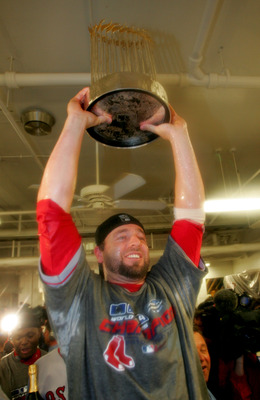 AE: For people like me that will never experience winning a World Series, can you describe what it was like to win a championship?
AE: For people like me that will never experience winning a World Series, can you describe what it was like to win a championship?
KM: It is indescribable, because you are men, you are dads, and you are husbands. You got gray hairs. Some of the guys have bad bodies. They are old, but yet we are kids. You are playing for a ring. You are playing for a World Series Championship. You are playing for a title. You are playing for a city. I am telling you, you can’t describe it.
The Boston Red Sox are number one at that point. 86 years they haven’t won anything. Say what you want with the Cubs. They are the lovable losers. They are cute. They drink beer on day games. I get it. It will be a cool World Series one day, but there is nothing like Red Sox nation at that point. That group of guys, because we were normal. We are bad bodied, normal guys not making $40 million a year.
We are not good looking. We are just normal guys. I think Boston related to us and we were like one big family. We were out. We didn’t have VIP limos dropping us off at the bar. We want a beer, we went across the street on Boylston and go get a beer. You put all that in. It doesn’t make sense, but is was that group, that year, that series, that championship, we were a bunch of kids and it was awesome.
Aug 26th

Tim Brown talks NFL, Notre Dame, and Raiders
Heisman Trophy winner Tim Brown has proved that he was one of the top NFL receivers during his days with the Oakland Raiders. The nine time Pro Bowler scored 105 touchdowns during his NFL career. He entered the College Football Hall of Fame in 2009 and was awarded the 2012 NCAA Silver Anniversary Award.
Brown, who had over 1,000 receptions in the NFL still does a lot after he retired from the game. Brown is the National Chairman for the 911 for Kids organization that educates kids on the proper use of using the 911 emergency service.
I was able to chat with Tim about his days at Notre Dame and in Oakland, golf events, and his work with 911 for Kids.
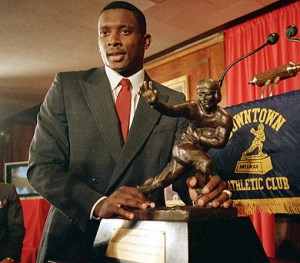 Art Eddy: You had an outstanding career in the NFL and in college at Notre Dame. Was winning the Heisman Trophy the top highlight of your career?
Art Eddy: You had an outstanding career in the NFL and in college at Notre Dame. Was winning the Heisman Trophy the top highlight of your career?
Tim Brown: Certainly it is the thing that I am known for. Maybe when or if I get into the Hall of Fame that will all change. As I sit here right now and people speak of Tim Brown they usually start out by saying Heisman Trophy winner, Tim Brown. I think from that standpoint absolutely it has been the biggest accomplishment so far.
AE: What was it like to play for Lou Holtz at Notre Dame?
TB: Well it was everything man. When Lou got there I was just a guy on the team. I was headed nowhere as far as football goes. Some inspirational talks with him, one on one for a couple of weeks straight changed my whole mindset towards football.
He kept telling me every day that I could be the best player in the country and not just on Notre Dame’s team. It took me a minute to believe that, but he was showing me what I was doing in practice on a day to day basis. By the end of two weeks I got to a point where I believed everything he was saying. Now it was up to me to go out and work on it. I decided to do that and things worked out pretty good. Every time I see him I bow down to him because if it wasn’t for him there is not Tim Brown Heisman Trophy winner.
AE: As I stated earlier you excelled in both the NFL and in college. Was there anything that surprised you from your transition from the collegiate level to the NFL?
TB: I think that thing that surprised me the most was that how great the athletes were at every position. The offensive tackles could run and do the things that you weren’t used to seeing the guys do in college. It was just amazing and you realize this is a whole different league here. You see everybody do what you thought no one else could do but yourself. So I think that was thing that surprised me the most was how great the athletes were.
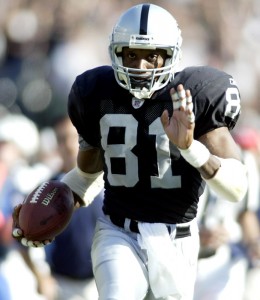 AE: What stands out for you most playing for a team like the Oakland Raiders?
AE: What stands out for you most playing for a team like the Oakland Raiders?
TB: The relationship I had with the fans. I think I had a relationship with Raider Nation that was second to none. Even after I played with the Raiders. The communication we had through my radio show, me being around town for 15, 16 years, and even I had the taste of Raider Nation in Los Angeles and Oakland.
I tell people that was part of me staying in Oakland. I had a couple opportunities like in the 1994 offseason where I signed with (Denver) Broncos and the Raiders matched that contract. Even after that I had two or three opportunities for me to leave. Part of the reasons for me not leaving was that I loved when I walked into the stadium, or when I walked into the mall, or when I walked into a restaurant, people loved me.
There was never a time where a Raider fan came up to me and said something negative. I think from that standpoint it gave me a sense of comfort that I just didn’t think I could build that over three or four years in some other city. That was a big, big part for me why I stayed in Oakland.
AE: Which teams did you look forward to playing against the most?
TB: Denver man. I hated the Broncos so bad. People asked me, why would you sign with them if you hate them so bad? I would say maybe because the money was too good to turn down. The Broncos were definitely the team that we looked forward to playing a couple times a year, every year.
San Diego also. For years we couldn’t beat Kansas City. So I couldn’t say that was a team we looked forward to playing. Certainly towards the end of my career when we turned things around a little bit all the AFC West, all of the three teams were something that we looked forward to.
AE: You made it to the Pro Bowl nine times. What are your thoughts on the new changes the NFL has made to that game?
TB: They are trying to do whatever they can do to keep interest for everyone playing. I do believe that this would generate more interest, but I think it will only be until the ball is kicked off. Once the ball is kicked off you are going to see the same type of football you have been seeing.
It is so much different from what it used to be. You have some players who have some nice contracts because they are Pro Bowl players. They were making millions and millions of dollars. Even towards the end of my career there may have been guys who made three or four million dollars. There were not guys making nine, ten, eleven, or twelve million dollars.
Now you have guys making that. It makes it almost impossible to say I am going to put this on the line, put my eleven million dollar salary that I got coming up next year on the line for a game that doesn’t mean anything. It is going to be very difficult for the NFL to make that game the game it used to be. Unless you pay the guys what they make per week that week, you are not going to see that much effort.
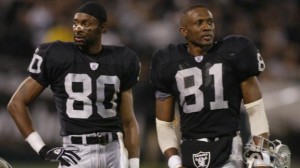 AE: You got to play with a lot of great players like Marcus Allen, Bo Jackson, Howie Long, and Jerry Rice. How fun was it to play with those guys?
AE: You got to play with a lot of great players like Marcus Allen, Bo Jackson, Howie Long, and Jerry Rice. How fun was it to play with those guys?
TB: It was great. Marcus really taught me how to play the game at a high level. How to deal with all the stuff you have to deal with. It wasn’t like he sat down and talked to me about this stuff. Just watching everything he dealt with the Raiders. How he kept practicing hard and playing great was something that could inspire anybody who paid attention to what he was doing to inspire you to another level.
Bo was just an incredible freak of an athlete. I just don’t think that there will be anybody to play the game the way like Bo Jackson again. You got Howie, who is the hardest working guy. He wasn’t the most talkative guy, but he led by example.
Having to be able to finish out my career with the Raiders with Jerry was super special. It was super special simply because for once in my career I had a guy on the other side who could garner the same or even more attention than I was getting. It freed me up to do some things. I had a great, great time with Jerry for those three years. For him to say he was coming over to help me get to the Super Bowl and actually accomplish that was amazing.
AE: I love the work you do with the 911 for Kids program as the National Chairman. How did you start working with that organization and tell me about the great work that this organization provides to the community?
TB: The true story behind that is I was in the locker room one day. Howie Long came in yelling my name. ‘Where’s Tim Brown?’ He didn’t sound like he was happy either. I was really trying to hide from him. In the locker rooms we had in El Segundo was a converted elementary school. All the rooms were very small. There were not that many places to hide. So I was moving around one corner and he did the same.
He put his finger in my chest and said, ‘Hey kid at the end of this year I am going to retire and you are going to take over for me.’ I was so scared I didn’t know what to say, but yes. I felt at that time it was the appropriate thing to do. I later found out that what he wanted me to take over for him was the being the National Chairman for the 911 for Kids. That was in 1993.
We have been going for more than 20 years. We have reached over 5 million kids with our program. Teaching kids the proper of how to use 911. We have awarded hundreds of hero awards to kids who have used 911 to save a family member or a friend. It has been an incredible program. It is a feel good effort on our part and live saving on these kids part. It has worked out great.
AE: What are some of the events that your organization does each year?
TB: We do a golf event every year. We hold the event at The St. Regis resort in Laguna Niguel. Every year we do a miniature minicamp. Three or four of those up and down the coast of California. We would love to have more volunteers for our minicamp and more sponsors for our golf tournament. It just makes it all go better.
Aug 25th

5 Ways to Make Your Fantasy Football Team Better
This weekend the NFL preseason began with the Hall of Fame festivities in Canton. Saturday saw Cris Carter, Jonathan Ogden, Dave Robinson, Larry Allen, Bill Parcells, Curley Culp and Warren Sapp enter into the hall. The Dallas Cowboys and Miami Dolphins will play the first preseason game of the 2013 season tonight. This means that we are now less than a month away from the kickoff to the regular season.
I can’t wait for this time of the year. It means watching the games and starting up fantasy football leagues. If you are like me you are in at least three to four leagues per year. With all the time and effort spent on building the best team out there you want to see a return on your investment. Here are five ways to help you get an edge in your fantasy league.
1. Podcasts
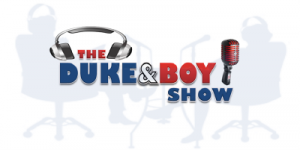 Just like any other topic there are many podcasts on fantasy football. The good thing about these podcasts are that the hosts put in all the time and effort into researching the best players. Make their hard work pay off for you. One podcast that I listen to for solid fantasy football insight that also makes me is laugh is the “Duke and Boy Show.”
Just like any other topic there are many podcasts on fantasy football. The good thing about these podcasts are that the hosts put in all the time and effort into researching the best players. Make their hard work pay off for you. One podcast that I listen to for solid fantasy football insight that also makes me is laugh is the “Duke and Boy Show.”
These guys are funny, but they get you ready week in and week out with great analysis. Plus they have very knowledgeable guests on their show. Writers from CBS Sports, Sports Illustrated, and more. They even have NFL players on the show to breakdown players in the league as well. So the next time you are at the gym or in your car just listen to the “Duke and Boy Show” to help with your fantasy team.
2. Watching Preseason Games
Now there are NFL fans out there that can’t stand to watch the preseason games. For the life of me I don’t get those people. I love watching any NFL game that is on the TV. Watching these games help you pick out the sleepers for this year’s draft. The more games you watch you get to see what players are making a constant contribution to their team. Not only are you noticing those players, but the coaching staff is doing that as well.
When you are drafting in the late rounds you can pick up another kicker or the running back that looks to steal the spotlight from an aging veteran. I have had a few successes (and fails to be fair) of a drafting a few sleepers by watching games in the preseason.
3. Be the Commissioner of Your League
Now by no means am I suggesting you use your powers as the commissioner to break the fantasy football code of ethics. Fantasy football karma is real and you don’t want to abuse your power. Being the commissioner of your league allows you to reach out to those friends and family members you want in the league.
If you don’t like the people that win on beginner’s luck don’t invite a newbie. If one guy keeps on stealing your draft picks each year, don’t invite him. You get the picture? Set up the league with friends who make the league competitive, but not the ones that drive you crazy.
You will find each week a guy you either want to drop or pick up. WAIT! Don’t make any foolish moves or trades. You drafted that guy for a reason. Give that player at least three weeks to see if they pan out. Some players jump right out of the gate, while others need a few games under their belt. If your bench can handle that latter player keep him there. One he might start scoring points for you or you can use that player as trade bait.
5. Don’t Be a Homer
Not talking about Homer Simpson, but “that guy” who drafts everyone from his favorite team. One or two players sure. Let’s say if you are a New Orleans Saints fan drafting Drew Brees and Jimmy Graham is definitely the smart move. Taking all the wide outs, tight ends, and running backs from the Saints is a big faux pas. Be a homer by wearing all your favorite team’s gear, not by drafting them. 
Hopefully these tips can make you the champion in your league. If you do win the championship by using this article I don’t mind a few dollars thrown my way. Just sayin!
Aug 4th

Going Back to Indy to Capture the Another Crown
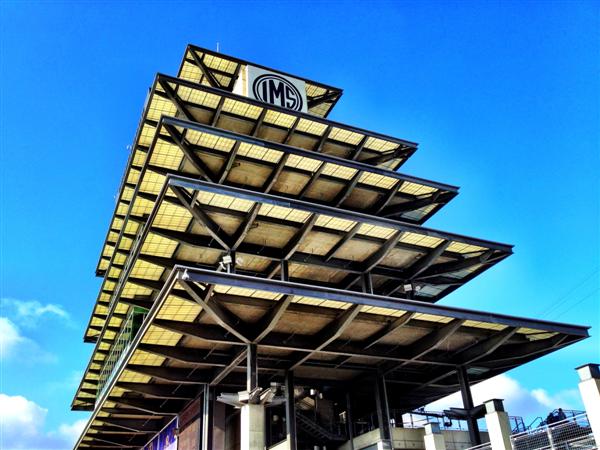
Last year Crown Royal sent me to Indy to participate in the Capture the Crown event at the Brickyard 400. It was a fun-filled weekend packed with music, purple cup parties, fast cars, a celebration of Curtiss Shaver, an elaborate scavenger hunt at the Indianapolis Motor Speedway, and of course, an ultimate victory for Team Win. With the help of David Dennis from TheSmokingSection.com and Nick Evans from StraightPinkie.com, we dominated the competition and took home some purple iPads and a trip to the 2013 NBA All Star Game. So yea, good times.
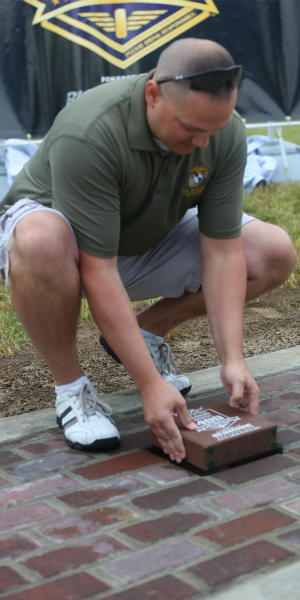 But this year is different. To make it fair for everyone, the Crown Royal folks decided to break up Team Win and distribute our talent to other teams competing in this year’s Capture the Crown scavenger hunt. Despite the loss of my quality teammates, I’m looking forward to defending last year’s title with my new squad.
But this year is different. To make it fair for everyone, the Crown Royal folks decided to break up Team Win and distribute our talent to other teams competing in this year’s Capture the Crown scavenger hunt. Despite the loss of my quality teammates, I’m looking forward to defending last year’s title with my new squad.
And this year Crown Royal is honoring another hero at the Brickyard 400. Gunnery Sergeant Samuel Deeds was awarded the naming rights for this year’s Crown Royal “Your Hero’s Name Here” program. By all account, Deeds, a die-hard NASCAR fan from Erlanger, Kentucky, is more than deserving of the honor. While deployed in Iraq, Deeds put himself in harm’s way by exposing himself to an IED blast while other marines were approaching his position. After 30 surgeries and lots of rehab, Deeds saw fit to save the lives of three people caught in a rip tide off the coast of North Carolina. I don’t know too many people who make it a habit of saving lives on the regular, but I look forward to meeting Deeds and shaking his hand.
Should be another fun weekend with good people, plenty of action, of course, purple cups of Crown and Coke in hand at all times (responsibly). Can’t wait to get out there again!
Jul 26th

Tim Hardaway talks about his days in the NBA, his son playing for the Knicks, and more
Tim Hardaway was fun player to watch in the NBA. Tim entered into the NBA in 1989 from his college playing days at UTEP. He played for the Golden State Warriors, Miami Heat, Dallas Mavericks, Denver Nuggets, and Indiana Pacers. He was a five time NBA All-Star and had his numbered retired by the Miami Heat.
Now Tim gets to watch his son, Tim Jr. follow his footsteps by playing in the NBA. Tim’s son got drafted this year by the New York Knicks. Hardaway also started up the Tim Hardaway Foundation to help kids have a brighter future.
I was able to chat with Tim about his playing days in the NBA, fatherhood, and his foundation.
Art Eddy: You played in college for UTEP and then was drafted in 1989 by Golden State. What was the toughest transition for you from college to the NBA?
Tim Hardaway: I really didn’t have a tough transition from college to the NBA because I had the best of both worlds. Every time that I went home during the summer I would play against NBA All-Stars. Michael Jordan, Craig Hodges, Mo Cheeks, Isiah Thomas, Doc Rivers, Terry Cummings, overseas guys, so I had the best of both worlds.
I had a whole bunch of guys that taught me about how to play the game of basketball. I was fortunate to have them to come back to Chicago and play in all the Pro-Am tournaments around the Chicago area. That’s how I became confident. That’s how I became real tough. So my transition from college to the NBA wasn’t that difficult. Plus, I went four years in college so that was great.
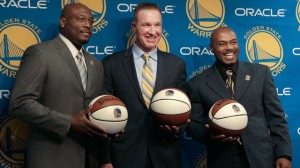 AE: I loved the nickname “Run TMC” given to you and the two other Golden State greats Mitch Richmond and Chris Mullin. How quick was it to build chemistry with those guys?
AE: I loved the nickname “Run TMC” given to you and the two other Golden State greats Mitch Richmond and Chris Mullin. How quick was it to build chemistry with those guys?
TH: It was great. You had (Mitch) Rookie of the Year the year I was coming in. You got an established ball player, a two time Big East Player of the Year in Chris Mullin. You had great guys on the team like Rod Higgins, Tom Tolbert, Jim Peterson, Alton Lister, Sarunas Marciulionis. You had a great Hall of Fame coach in Don Nelson. Had some great assistant coaches. The organization was great.
I couldn’t have thought about coming into a better situation for myself. It was an easy transition for me because I had people that cared about young people and guys who were veterans.
AE: You were known for your killer crossover move that would break ankles. When in your career did you master that and did it become your go to move?
TH: It wasn’t my go to move. I just did it. I just came down the court and did it. It wasn’t like I was going to do the move on this guy. I just came down the court and did a series of moves. If it was a crossover, it was a crossover. If was me in an in and out move coming off a pick and roll, I was going to pick and roll. I just worked on my game to perfection to do all those things the correct way. I would try and get me and my teammates open for a better shot. I worked hard on my game to get it to where it was real good.
AE: You reached 5,000 points and 2,500 assists faster than any other NBA player, except Oscar Robertson. What did that milestone mean to you? To me that is an amazing stat.
TH: That is an amazing stat. I couldn’t have done it without coach giving me the ball and saying, ‘Go for it you are running my team.’ You can’t have assists without guys that can put the ball in the basket. I was fortunate to have all this stuff play out in a way that I like to play and a coach that gave me the ball and said ‘run my team.’
I had great guys on my team that loved to play and I loved giving the ball to them. It was an accolade that I never knew nothing about. You always have to get accolades. It was nice then, but I always wanted more.
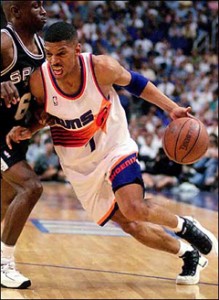 AE: Who gave you the biggest headache on the court?
AE: Who gave you the biggest headache on the court?
TH: Oh man, Kevin Johnson. Rod Strickland, Gary Payton, John Stockton. Each and every night you had a game to play. You had Magic Johnson and Byron Scott and Coop (Michael Cooper). Every game was tough. I guess to answer your question the guys that I liked and loved going against were Kevin Johnson was one, John Stockton was two, and Gary Payton was three. It was tough day in and day out on the west coast.
AE: As a father you get to watch your son, Tim Jr., play in the NBA. He just recently got drafted by the New York Knicks. What advice did you give him about playing in the NBA?
TH: I think that he already understands. He is very humble. He is like a sponge. He wants to learn. He doesn’t like losing. He is a competitor. He has heart. He has confidence, all you want in a basketball player.
He is going to a team that is trying to get their image to be well liked around the NBA. I think that they have done that. They brought in some key pieces. I think fans around the NBA like what they are doing. He will be a consummate pro. He is going out there and learn and be taught and just like a sponge he is going to absorb everything.
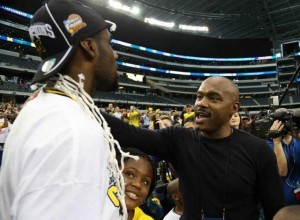 AE: Also he and his fellow teammates at Michigan had a heartbreaking loss in this year’s NCAA tournament. What did you tell him after the game?
AE: Also he and his fellow teammates at Michigan had a heartbreaking loss in this year’s NCAA tournament. What did you tell him after the game?
TH: It was hard to try and tell him anything. I think that he understood the situation. I think the coach handled it in great fashion. They exceeded all expectations. If it wasn’t for Behanan getting three or four offensive rebounds they could have won. They took it as well as I expected.
I didn’t have to say nothing. When I asked him, ‘How are you doing?’ He said, ‘It hurts, but I am fine.’ That was the extent of our conversation. That was if for that. As long as he said he was fine. You got to let your kids, like I was brought up, you got to let them get through the bumps and bruises. The good and the bad and the heartbreaks of the game. They did that all season long. It is going to prepare him for the next challenge in his life in the NBA.
AE: Tell me about the great work you do with your foundation.
TH: The Tim Hardaway Leadership Academy is about reaching out to the kids and preparing them for life. Making sure that we care about them. Making sure that they understand to respect themselves. Go to school and get their education. Respect their parents. Respect the teachers that are teaching them.
My grandmother always quoted Martin Luther King, ‘Be somebody.’ Make your parents proud. We are going to help you out with tutoring. We are going to help you out with counseling. We are all here to build a village. It is just not one person to build a village. Everybody has to come out and build a village. That is what we try and do. We are out here as a team and helping each other and working with each other to strive for better in the world. That is what the Tim Hardaway Leadership Academy is all about.
AE: What motivated you to start that up?
TH: People gave back to me. I wouldn’t be here today if people didn’t give back to me. They opened up their eyes and helped me out to keep me off the streets of Chicago. They cared about me to point me in the right direction. You don’t need to go there. You need to go this way.
I had parents too. A lot of kids don’t have both of their parents. I was lucky. I had both of my parents. Even though my parents were divorced, my dad used to live right down the street. My mom would him and say the boys are acting up. He would be there Johnny on the spot with his belt ready to discipline us.
I wish more kids had both of their parents, their moms and their dads especially their dads. No matter if you are a girl or a boy. You definitely need your dad in your life. People gave back to me. I want to give back to them to help these kids out. These kids are our future. I am on my kids every day. Talking to them and making them understand saying, ‘No that wasn’t right.’ You got to have them accountable for what they do. If they aren’t accountable for what they do than they can go anywhere and do anything that they are not supposed to do. So that is why I am here and I am doing it.
Jul 24th

ESPN’s Matthew Berry talks about his new book “Fantasy Life”
If you are into fantasy baseball or football leagues you know the name Matthew Berry. The man dubbed “The Talented Mr. Roto” can be seen on ESPN or heard on podcasts everywhere breaking down who you need and should draft for your fantasy league.
This month Matthew released his book called “Fantasy Life.” Whether you are a fan of fantasy leagues or not this is a must read. There are stories in this book that will inspire you, make you cry, make you laugh, and reassure you that you are not as crazy as you thought. There are stories of people eating moths as a rite of passage to get into one league and in another league you must get a tattoo if you come in last place. See you and your league are not so crazy after all.
“Fantasy Life” is a great read. You find out where Matthew got his start in the entertainment field and at what age he started his journey into the fantasy sports world. Get the book here!
Matthew was able to chat with me about the book, working at ESPN, and he even gave me his top three players that you should draft for this year’s fantasy football league.
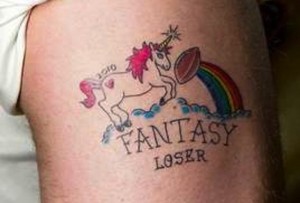 Art Eddy: Lot of questions I want to ask you, but let’s start out talking about your fantastic book “Fantasy Life.” Love all the stories that you share whether they are your own or if they are from other people like the tattoo league. When did you realize you wanted to write this book?
Art Eddy: Lot of questions I want to ask you, but let’s start out talking about your fantastic book “Fantasy Life.” Love all the stories that you share whether they are your own or if they are from other people like the tattoo league. When did you realize you wanted to write this book?
Matthew Berry: This is going to sound a little bit trite, but it is a two part answer. The trite part is I felt like I finally had a last chapter. Book starts off with me as a fourteen year old boy in my very first fantasy league. If you have ever read my columns you know that I always put in a personal story in every single column.
Every chapter has a personal story in my life starting when I was fourteen years old ending up at ESPN, married, and the birth of my daughter. So I felt like I finally had kind of a last chapter that the journey, not over, but completed. At least that particular journey. From point A to point B that coincided with the rise of fantasy sports in America.
The other thing was that I had so many stories that I wanted to do something with them. I didn’t have any place to put them. You mention the tattoo league. There are these guys in Omaha, Nebraska called the tattoo league. Go to YouTube and search “tattoo league” and you will see it. It is hilarious. The loser of this league has to get a tattoo chosen by the winner. It is unreal. There is a twenty five year old guy that is walking around Nebraska right now with a tattoo of Justin Bieber’s face. They sent me that. They have done this for three years now. I am like I got to do something with that. I got to put this in a book. I got to do something with this. So those were the two things.
AE: You started playing in fantasy leagues at the age of fourteen. There are a lot of mentions in your book where how leagues worked back in the day to now. Smartphones and tablets help people out these days. Are you a traditionalist or are you happy with all the great innovations there are now for the world of fantasy leagues? 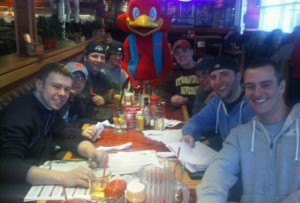
MB: To answer your question it is a little bit of both. Obviously I like the fact that I can play fantasy football on my phone or my iPad. The one thing that I am old school about is and is kind of disappointing is that thanks to all the great advances in technology you no longer have to be in the same room to draft. I think that it lessens the experience.
Drafting is such a great day and experience. It is so amazing. I got unbelievable draft stories in the book. Two hours before he is supposed to draft a guy gets called into work. Everyone is like this is the only time that we are together and the season starts tomorrow. He is like, ‘Dude, what do you want from me? I need this job. Somebody called in sick. They called me into work. I got to do it. I can’t lose this job.’
They are going to go to his work and do the draft while he is at work. The place where the guy was working was the Red Robin restaurant, where he was dressed as the Red Robin. Every ten minutes or so he would waddle over see what they picked. As he said it turns out a cheat sheet in taped inside my beak was not ideal. But he ended up getting it done.
You can do it online and you can do it from your phone, but that is a memory that they will always have. It was the most fun draft that they ever had in the history of this league. I got a picture in this book with nine guys and this guy in a big red bird costume. It is just one of those things where I think that I am old school in that you need to be in the same room to draft. I hate the online draft.
AE: Speaking of pictures in the book. How many times do you get a Napoleon Dynamite reference when people see that picture of you when you were fourteen? 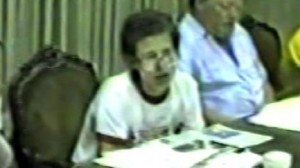
MB: Every time. I think that I have a lawsuit there. I got the big frizzy hair and the thick glasses. It was brutal. I absolutely have a lawsuit against Napoleon Dynamite.
AE: I am a big fan of fantasy leagues. I love being in them. Not only does being in a league make the NFL more interesting, but the relationships that are created and maintained is something you illustrate in your book. I love the story about BJ and his friends coming to visit him in the hospital. With all the stories you have seen it just goes to show the reader how strong a bond people have in these leagues right?
MB: Absolutely. They are an extended family. They are the people who you become closest to. I think that is one of the themes that is in the book. It is sort of what fantasy means. There are a lot of wacky hijinks obviously. There are crazy stories, but there are also stories about fantasy bringing people together. Families, husbands, wives. I talk about the league that I do with my wife, my kids, their friends, and their parents as well. Fantasy brings people together.
AE: How many texts do you get from your close friends for help with their fantasy team? Any sport worse than others?
MB: Maybe ten or fifteen, not a ton. Most have already emailed me earlier in the week. I get some panicked texts Sunday morning, but not a crazy amount. I get a couple thousand tweets. It’s insane. There is no lack of people trying to get advice one way or the other.
 AE: For people who are looking to get into fantasy leagues, is football the best sport to try first?
AE: For people who are looking to get into fantasy leagues, is football the best sport to try first?
MB: You should join a league with a sport that you love. If you are a baseball fan and not a football fan it makes a lot more sense to go there. In general you are right. (Football) is a shorter season. There are less players to know. In fantasy football it is mostly the stars that you are drafting. It is the quarterbacks, running backs, wide receivers. It’s a tight end. It is a team defense. So it is all name players.
Baseball and basketball go a little bit deeper. It is an easier barrier to enter. There is also a lot more people playing, so it is easier to find a league. I feel like everyone has a fantasy football league.
AE: You are a father and you say you do a few leagues with the family. Isn’t that a great way for a family to bond? Well unless you are Michael All who beat up his 66 year old dad over their fantasy league. When you saw that story did you question if that story was even real?
MB: Yea. I found it through news reports. It is one of those things where you say where did life go wrong? What happened on the path where you find yourself in a fantasy league with your father and then beating him up over payouts?
The thing that I love about that is can imagine you got to jail and you get your one call. The kid, his one call is like, ‘Hey mom, can you bail me out of jail? I kind of beat up dad.’ What the hell?
AE: Speaking of fatherhood your chapter on cheating is a good way to show your kids that cheaters never win. Just another great way fantasy leagues help us in life. Do you talk to your kids on cheating using your family’s fantasy league as an example?
MB: Well for us it is a very low stakes league. So no, we never had the opportunity. Something hasn’t come up where we needed to address it. I am the commissioner of the league. I run it with a strong firm hand. The kids have been raised right so they know in general cheating is wrong.
AE: Right now for fantasy football who are the top three guys in order you have going first, second, and third in this year’s draft?
MB: I think you have to go running back early this year. At the moment I have Adrian Peterson, Arian Foster, and Doug Martin.
Jul 24th

Bonnie Bernstein explains how Campus Insiders takes fans deep inside college sports
A new mobile app launched by Campus Insiders takes fans deep inside college sports with game highlights, interviews and a behind-the-scenes perspective of the trending stories of the day, from on-camera hosts Bonnie Bernstein and Seth Davis, as well as top college analysts, former coaches and special contributors.
Campus Insiders is the online destination and leading digital content syndication source for college sports fans. The app is free and now available for iPhone, iPad and Android devices. It provides an interactive user experience that enables college sports fans to access the same content available at CampusInsiders.com, along with the insight and perspective of Campus Insiders’ stable of experts, including broadcasters Bonnie Bernstein, Seth Davis and the nearly 100 Insiders from college campuses across the country.
The Campus Insiders app features breaking news and video alert, video on-demand, filtered by sport, and daily original programming, including live programming (starting this Fall) featuring Bonnie Bernstein and Seth Davis.
I had the great pleasure to speak with Bonnie Bernstein about the Campus Insider website and app, her career in sports journalism, and much more. Be sure to click on the link below to listen to the entire interview.
 Art Eddy: You and your team at Campus Insiders created a very cool app. Tell me about the app and why people should download it to their smartphone or tablet?
Art Eddy: You and your team at Campus Insiders created a very cool app. Tell me about the app and why people should download it to their smartphone or tablet?
Bonnie Bernstein: The app is one of the many Campus Insider platforms we have. Of course we have the website, we have the app available for your mobile, your smartphone, and iPad. Just like the network that was in its fledgling stages we have written editorial and video, but we are really emphasizing the video right now.
All of the different segments that we create during our live shows will also be available on demand on the app. In the event you miss my show or Seth Davis’ show you can find it any time. We have a whole written editorial side Pete Fiutak, our managing editor, he is terrific.
One of the really exciting pieces is that we are shooting for by the time the college football season starts, the ability to live stream games. We have exclusive digital rights to some of those smaller conferences like Mountain West, West Coast Conference. We are working on the Patriot League. We are in discussions with some other conferences. Just like so many people go to their television to watch games, you are going to be able to watch it on your app or online at Campus Insiders.
AE: One of the cool things I like about the app is the behind-the-scenes content. What made you guys decide to do that?
BB: We really wanted to our name to as a literal extent as we can. The whole premise of Campus Insiders is that we will have our “insiders” embedded on campuses all over the country. If there is a breaking story ESPN, CBS, or Yahoo would send a reporter to that site. We are going to have our insiders embedded on campuses, embedded with the teams, dealing with the coaches on a daily basis.
We are really encouraging to break their news with us. These are play by play guys, color guys, beat reporters, newspaper reporters. They are all the reporters that are covering these teams. We are incentivizing them to break stories with us. Give us that inside look. What is going on in practice and send us an Instagram photo. If you are on sideline and there is a star player who is questionable because he tweaked his ankle, get that information to us.
We really want to take our viewers and our fans inside what we do as a network. We are in this day and age where we are all trying to get our heads around what is it that make a video go viral. What my sense is that it is not the polished journalistic video unless of course you are breaking news. It is that raw behind the scenes how are you making the sausage kind of video. We want to take people inside our production meetings and let them see how it is that we are deciding what we are going to be talking about during my show. Go into the control room and see how the producers are working. See how the directors are working the shots. That is a really exciting part of what we are doing and it is kind of unique.
AE: Tell me about the site Campus Insiders itself. What was the catalyst to start up that site?
BB: Campus Insiders is a partnership between IMG College, which is America’s largest college sports marketing firm, and Silver Chalice. (Silver Chalice) is a digital media company that was founded by Jerry Reinsdorf, who owns the White Sox and Bulls.
Silver Chalice has already had success, most prominently with the ACC Digital Network, which fairly recently superseded the SEC Digital Network as the number one most viewed college sports site. IMG College was looking for a way to take all of their great properties and the relationships they have with their schools and create content with it.
So IMG College spent a year talking to the AOL’s, the Yahoo’s of the world and trying to find the right digital media partner and came upon Silver Chalice. After a lot discussions they felt as though we were the best fit. They understand the extraordinary production value that we bring to the table and we partnered up.
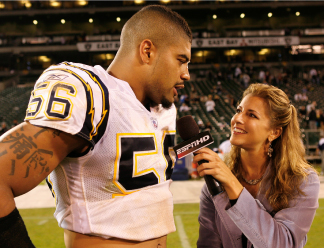 AE: What drove you to get into sports journalism?
AE: What drove you to get into sports journalism?
BB: I have always maintained that you are a product of your own environment and both of my parents are die-hard sports fans. It is basically that simplistic. When I was a kid we didn’t have remote controls that you could steal from mom and dad and put on whatever you wanted to watch. You physically had to walk up to the television and change the channel. If you knew my dad you know that he is tall and imposing. Whatever dad wanted to watch, the kids are watching.
It is not just my dad, my mom is a die-hard sports fan. Both of them grew up in Brooklyn. Die-hard Dodgers fans. When they moved out west and the Mets came into town. We are a baseball family. We are a football family. My parents are more passionate about the NBA and my mom in particular with hockey than I am.
When I would be out covering games for the NFL on CBS I would call my mom. You are covering the game and you can’t keep an eye on everything else that is going on. My mom would be the human sports ticker. The Jets lost. The Giants lost. This one threw for four touchdowns. Because I was exposed to sports at such an early age it was just something that naturally rubbed off on me.
I did a lot of creative writing. I remember the third grade and fourth grade I have always been an athlete. I played soccer when I was five and gymnastics, my primary sports, when I was seven. I did that for fourteen years all the way to the University of Maryland.
I realized very early on that not only did I love sports, but I loved writing. I decided to find a career that enabled me to tap into both of those passions. I wrote about sports in my high school’s paper and specifically went to the University of Maryland because of the reputability of their journalism school. Wound up gravitating toward broadcast, which wasn’t really in the plan. I really wanted to write for Sports Illustrated, but I loved the TV classes at Maryland and I sort of stuck with it. Twenty plus years later here we are. I feel very blessed that I established a dream early on and I have really been able to achieve it.
AE: How tough was it and is it still today to be a woman in sports journalism?
BB: Well relatively speaking I think it is easier. The Lisa Olson’s, the Lesley Visser’s, and the Christine Brennan’s of the world paved the way for us. Years ago women were not allowed to be in locker rooms. So just that very fact that we are enables us to do our job.
I think the thing that people don’t realize is that we are not going into locker rooms because we want to. The simple fact of the matter is that we are on deadline. Once the game is over you have to get in. You don’t have time to wait for players to take their showers, to put their jewelry on, their suits on and walk outside and be all relaxed. You got to a story to write or you got a TV show to get ready for. So more than anything it is a matter of time.
In terms of the perception of women in the business I think that it has gotten better overall. To a certain degree I think that it is an individual thing. I think it is incumbent upon any woman who wants to get into sports journalism to take pride in her work. I hope that fans make their judgment on sort of a case by case basis. If you are good at what you do and you do it well consistently, then there is really no room for people to criticize. Unless they simply don’t feel that women have any business covering sports that they haven’t played.
People are certainly entitled to their own opinion. The one thing that I don’t think that fans understand is that there are many, many men, who cover sports, who haven’t played that sport as well. When you take that into consideration, the fact that I played a Division I sport, from a psychological and preparatory stand point puts me on par with anybody. I know what the mental process is like to prepare and to be in the heat of competition and the amount of focus that it requires. So when I am formulating questions they are coming from experience.
AE: What advice would you want to give women who are thinking about a career in that field?
BB: Well I would say don’t just watch sports, but really listen. By that I mean don’t watch the big game on a Saturday night with a bunch of friends at a bar. If you really want to learn about sports not only do you learn by watching, but by listening to what the play by play, the color announcer, the sideline reporter are talking about. You would be amazed at how much you can learn about sports.
Watching the games. Watching the specialty shows, like College Football Live, there are so many shows out there. The other thing that I would really recommend is networking. If you are in college right now or in high school, make sure you seize all the opportunities. Intern or serve as a runner for the networks when they are coming to cover the events. Show them that you have that passion and that you are willing to take that initiative. Collect those business card and stay in touch with those people. You never know that those folks that you meet along the way can be a tremendous resource in helping you get a job.
AE: You have covered a ton of great sporting events like a few Super Bowls. Is there an event that stands out more than others?
BB: I would say two in particular. The very first Super Bowl I covered which was down in Tampa in 2001. The Ravens Giants (game). New York kind of got pounded, but it was the first Super Bowl that I have done sideline for. It just so happened that I was assigned to the Giants sideline.
I had to interview Jim Fassel before the game. Just having access to the team and the coaches before the game and I remember the day before the game. The Giants has their final run through. I walked with Fassel from midfield to into the tunnel as he was going into the locker room. Just having the ability to have that conversation with a coach about what is going on in his mind as he is preparing his team to play in the “holy grail” of NFL events. I really took the time to soak that up.
The other big one was the Maryland run to the 2002 National Basketball Championship. I went to Maryland and I was there from late 80s early 90s. I call it the dark days of Maryland basketball. I got there and we were not too far removed from Len Bias. My freshman year the basketball team the coach there got nailed for all of these NCAA recruiting violations.
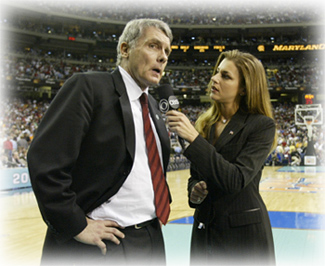 Gary Williams came in my sophomore year. He was faced with probation, TV bans, and postseason bans. It really was a mess. I did stuff for our school. I did campus newspaper, campus radio station, and campus TV station. I had the chance to meet Gary Williams when I was a sophomore in college.
Gary Williams came in my sophomore year. He was faced with probation, TV bans, and postseason bans. It really was a mess. I did stuff for our school. I did campus newspaper, campus radio station, and campus TV station. I had the chance to meet Gary Williams when I was a sophomore in college.
So to see all of his hard work culminate in a National Championship, when I got the opportunity to cover every single one Maryland’s games with Jim Nantz and Billy Packer. To be standing on the court at the Georgia Dome watching the players standing on the podium. Watching themselves in highlights of one shining moment was so surreal. I sort of felt like very few people in that arena that night that could appreciate how monumental of a moment that was because where the program came from. It was really, really special to me.
Since Bonnie is well versed in every aspect of sports I asked her opinion on the whole Johnny Manziel situation. To listen to her take on that issue, challenging Dan Le Batard and his father to a showdown with Bonnie and her mother on a sports show, and the entire interview click here.
Jul 18th

Check Out Tony Gonzalez and His Clear Men Scalp Therapy Spot During Tonight’s ESPYS
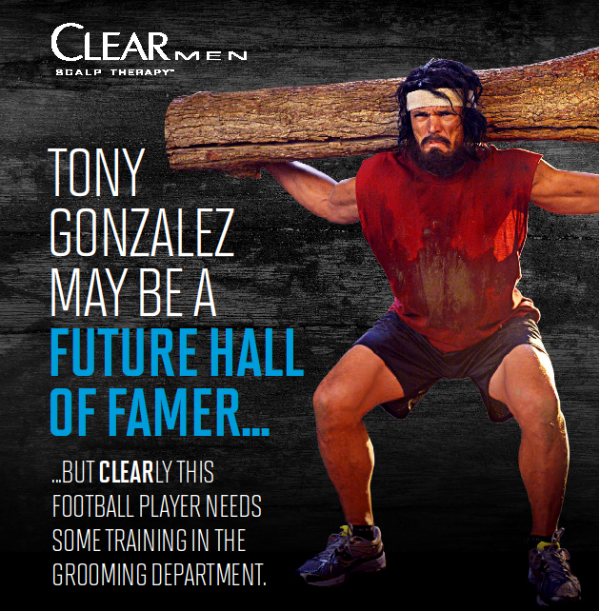
Today is one of the slowest sports days of the year. Major League Baseball is on hiatus until Friday. The NFL preseason kicks off next month. Basketball and hockey players are all on vacay. What’s a sports fan to do?
Well luckily the ESPYS are on tonight, so there’s some light at the end of today’s sports-free tunnel. Plus, MANjr enthusiast/future Hall of Famer Tony Gonzalez is going to appear as a presenter and star in his own TV vignette during tonight’s broadcast. Make sure to check out the ESPY’s at 9pm EST tonight so you can see this engaging spokesman in action.
You can also visit the Clear Men Scalp Therapy Facebook page before tomorrow for a chance to win two tickets to the 2014 ESPYS. You know we’re gonna hit the same sports lull next year, so might as well be prepared, right?
Jul 17th

C.J. Wilson Talks All-Star Game, Angels, and more
C.J. Wilson was in New York City today as he was taking in some of the MLB All-Star Game festivities. He and his team the L.A. Angels are 11 games behind the Oakland A’s in the American League West. He knows that after the All-Star break the Angels need to start playing at a higher level to even get a chance to play in the postseason.
Wilson and I were able to chat about the All-Star Game, his transition from Texas to L.A., and where are some of the toughest places to play.
I was able to chat with C.J. thanks to Head and Shoulders and their “Season of the Whiff” program. For every “whiff” across the league during the 2013 regular season, Head & Shoulders will make a $1 donation to the MLB Reviving Baseball in Inner Cities (RBI) program.
Art Eddy: You are in New York for the All-Star Game festivities. How has it been so for in NYC?
C.J. Wilson: I am doing great. It’s a blistering hot day in New York. I am indoors in the air conditioning. I hope you are too.
AE: I am. I take it the heat in L.A. is a dry heat.
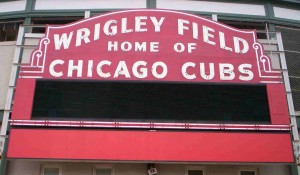 CW: That whole dry heat thing is a sham. You go to Arizona and it is 120 degrees. An oven is a dry heat, but if you stand in there long enough you are going to feel the effects. When we travel to go play in different cities you experience heat in different ways depending on the configuration of the ballpark.
CW: That whole dry heat thing is a sham. You go to Arizona and it is 120 degrees. An oven is a dry heat, but if you stand in there long enough you are going to feel the effects. When we travel to go play in different cities you experience heat in different ways depending on the configuration of the ballpark.
Some ballparks aren’t bad. We were in Chicago the other day. The dugout is so small, in Wrigley Field. The dugout was so small that there was no way to escape the heat. It was really funny. We were all sitting there thinking of ways to cool off. We had no room to wave anything at all without hitting each other in the face.
AE: That is hilarious. This week is All-Star Week and today is the All-Star Game. You played the past two years in that game. What is it like to play in that game?
CW: The All-Star Game is cool, but it is also really weird. It is a bit of a circus and you don’t get the same amount of time to prepare for the game. You don’t get to get a scouting report. You show up to the stadium at 5 o’clock because you are coming back from media availability.
After those interviews it is like okay no go in the bullpen to get ready. You are like who is going to warm me up? They are like there is only one catcher. I ask if there is anyone to throw a long toss with and they say there is no time for that.
It is a little bit different, but it is very exciting too. The game is going to be sold out. You got to see some of these guys up close and get to know them. I didn’t know Robinson Cano was the coolest dude on the planet. Now I know that he is the coolest guy. I just thought he was a guy that smiled a lot and was really good at baseball. That is kind of the fun part for the players.
Players enjoy that kind of stuff. The travel is a little bit hectic. For us we played in Seattle, so (Mike) Trout had to fly a red eye from Seattle to New York. He had to be ready for media availability yesterday morning. Things like that is hectic. It is nice when it is in a place like Kansas City, where everyone is about a 2 hour flight away.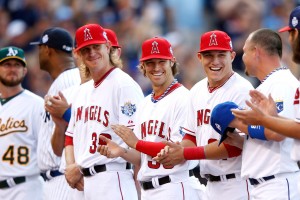
AE: Even though the league that wins that game get home field advantage in the World Series is there less of a competitive vibe in that game?
CW: We are all hyper competitive, which is why we are professional athletes. There are guys who are very competitive and they end up having off the field issues. Like Michael Jordan had the golf gambling thing a few years ago. All professional athletes are hyper competitive or they just don’t stay in the league long enough.
Everyone wants to win and everyone wants to do their best. If you make one mistake than you lose the game and you are the goat. That is what happened to me a couple of years ago. That really sucked. We didn’t score that many runs and I think we lost 3 to 1. The game is always fun. You are always trying to win. You are not necessarily thinking about October, but about how can I pitcher really well. You are always trying to do well whatever they are doing.
AE: You are now in your second year with the Angels. How has this year been different from last year for you?
CW: For me it has been a little bit better in terms of my health and my performance. About this time last year was when my season was going south with my elbow. The changes I have made to my mechanics are going to keep me healthy for the rest of my career.
We are down below 500 which is not very good. We have a lot of potential and a lot of talent, but potential is kind of a four letter word for baseball. We are looking to improve on that. We only have so many games left. We got to start winning.
AE: You kind of hit on something I want to talk about. Do you look at the media and read that you and your team are underachieving or do you just not even pick up the paper?
CW: No, we feel that way. We feel like we should be better. Some think that teams and players are oblivious to that fact. We are not totally oblivious. We are not going to read the papers if we are not doing well. What is the point of reading the papers if you are below 500.
If you are in first place by 15 games, well of course you are going to read the papers since they are talking about how awesome you are. It helps boost your confidence. You just have to control yourself and find the best way to play your best baseball. We have been through some good stretches as well as bad ones. We have to play great baseball every day. Players like myself, Josh Hamilton, Albert Pujols have played on Championship teams. You have to bring your A game every day to win 90 games.
AE: Where is the toughest place to play for you whether it be a hitter’s park or the crowd gets into it?
CW: It goes in waves. Sometimes you will step into a place and you won’t really feel good pitching there. Then all of a sudden you will have a good game. I didn’t used to like playing in Yankee Stadium, but now I do. It goes up and down. I really like pitching in Seattle. I like pitching in Anaheim and Dodgers Stadium.
For whatever reason I don’t do real well in Detroit. It is supposedly a good pitcher’s park. I have given up some weird opposite field home runs there. The dimensions there don’t help me out at all. It is deep in center field, but I don’t give up home runs in center field. If I give up a home run it is straight down the right field line. It is kind of a quirky thing.
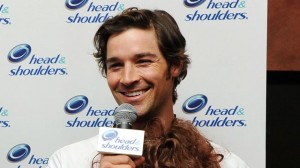 AE: How is it to be a “Mane Man” for Head and Shoulders?
AE: How is it to be a “Mane Man” for Head and Shoulders?
CW: Well the cool thing that is going on for the All-Star Game tonight is that whoever is pitching in the second inning strikes out the side then they win 1 million dollars for their RBI program. Head and Shoulders will donate a million bucks to help kids who normally couldn’t play baseball now can. They are going to get equipment, coaching facilities and all that good stuff. Since this is ‘Season of the Whiff,’ so they are doing a strikeout theme this year at the All-Star Game. For this season Head and Shoulders will donate a dollar for every strikeout for the RBI program.
AE: Tell me about your foundation, the C.J. Wilson Children’s Charity.
CW: In baseball you get opportunities to get out into the community. When I was with the Rangers they encouraged us to get out and help out the community. One of the first things I did was a Christmas event. I met this kid at the Children’s Hospital. We had a moment. We were talking for a bit. I met his dad. I didn’t really think that much of it.
He wrote me a letter and included a picture of me and his son. It was really inspirational letter. He said that I was really good at this and that I should do more of this type of work. I took that personally and hit him up to see if he could help me. He had mentioned that he was on a board for a charity.
Since 2006 we have done a lot of events. We had video game tournaments, bowling events, and stuff with my racecar team. We even did a charity concert at my car dealership. It is really cool to have the charity tie in everything with my off the field interest with my on the field performance for a good cause. We raise money for Children’s Hospital and kid’s camps and things like that.
Jul 16th
